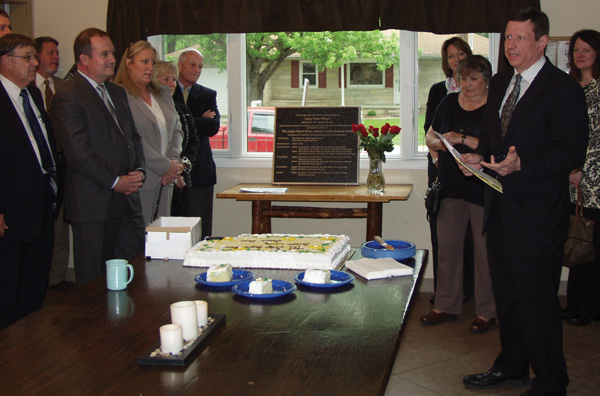
The name of a former Jackson circuit judge who sometimes opened his home to troubled youth now graces a residential home he helped establish to serve those youth more than 30 years ago.
“Dad grew up in challenging circumstances and empathized with kids who do,” Indianapolis attorney Doug Brown said of his father, the late Robert R. Brown.
Judge Brown sat on the bench of Jackson Circuit Court for 28 years and was instrumental in establishing the Jackson County Juvenile Home at 416 E. Walnut St. in the late 1970s.
On May 9, 2013, the home was renamed Judge Robert Brown Jackson County Juvenile Home.
Dan Banks, who has been director of the home for 18 years, said it took a year’s worth of renovations totaling more than $100,000 and a lot of planning to get to the open house and renaming ceremony.
“In the mid-1970s, Judge Brown felt a place was needed for local youth who were having problems but whom he felt he could help,” Banks said.
Norm Bluebaum, who was the director of the home for its first 12 years, said he never had any doubts about the home and its future.
“I knew from the beginning that we had the right approach to the problem,” Bluebaum said.
That approach involved keeping the families of the youths staying at the home involved in their lives, Bluebaum said.
He said Brown provided a steady hand in the operation of the home and was careful to choose the right people to help families learn to help themselves.
Bluebaum said both boys and girls were housed at the home in the beginning.
“We weren’t sure how that would work out,” he said.
But it did, in part because, at that time, Bluebaum and his wife, Penny, lived at the home.
The home now accepts just boys 12 to 18 who have been removed from their homes because of family problems or who have been judged to be delinquent.
Youth staying at the home attend school and are offered therapy, counseling and other assistance in a structured environment. They also are allowed to participate in activities available to other youth in the community in the hope they will go on to become healthy, productive members of society.
Bluebaum said he believes many have done just that over the years.
“I’ve kept in contact with many of those who stayed at the home while I was here through Facebook,” Bluebaum said. “Some in the community would find it hard to believe, but many of them have turned out very well.”
He also said many in the community don’t even know the home exists.
Connie Hehman, who once worked for Brown and is the only member of the original board, said the hope that the home could turn around the lives of some youth is one reason she has stuck with it since the home opened in 1980.
The push to build the home began with a group of community leaders known as Positive Action for Youth.
“I’m not sure he (Brown) was convinced we could get it done at the time, but we kept pushing, and he kept supporting us,” Hehman said. “I can remember going into fields and getting county commissioners like John Emily down from their tractors to talk to them about the home.”
Once some of the commissioners and county council members got on board with the idea, Brown added his complete support, Hehman said.
She said she doesn’t plan to relinquish her board seat until she no longer can do the job.
Doug Brown, who attended the ceremony with other family members, said his father was humble about his role in helping establish the home as well as its continuing success.
“It would have meant a lot to him,” Brown said of the name change.
He said his father—early in his judicial career—often fretted about how to help troubled youth who came before him.
“Occasionally, he offered our home as a reprieve from their own difficult home lives,” Brown said.
He said the home has served as a place for troubled youth to cool down after experiencing an issue that brought them into contact with the judicial system. It also gives judges an option when it came to dealing with troubled youth, Brown said.
Jackson Superior Court II Judge Bruce MacTavish, who conducted the short renaming ceremony, said Judge Brown left a lesson of fairness, civility and commitment to the juvenile justice system in Jackson County.
MacTavish’s court focuses on family issues, so he generally sees many of the youth now using the home’s services.
Banks said Brown never sought credit for establishing the home but quietly found a way to help the youth who appeared before him in his courtroom.
Editor’s Note
This article was originally published in The Tribune, a Seymour, Indiana publication and re-printed with permission of the author:
Aubrey Woods, Reporter
The Tribune
101 St. Louis Avenue
Seymour, IN, 47220
1-812-523-7069
[email protected]